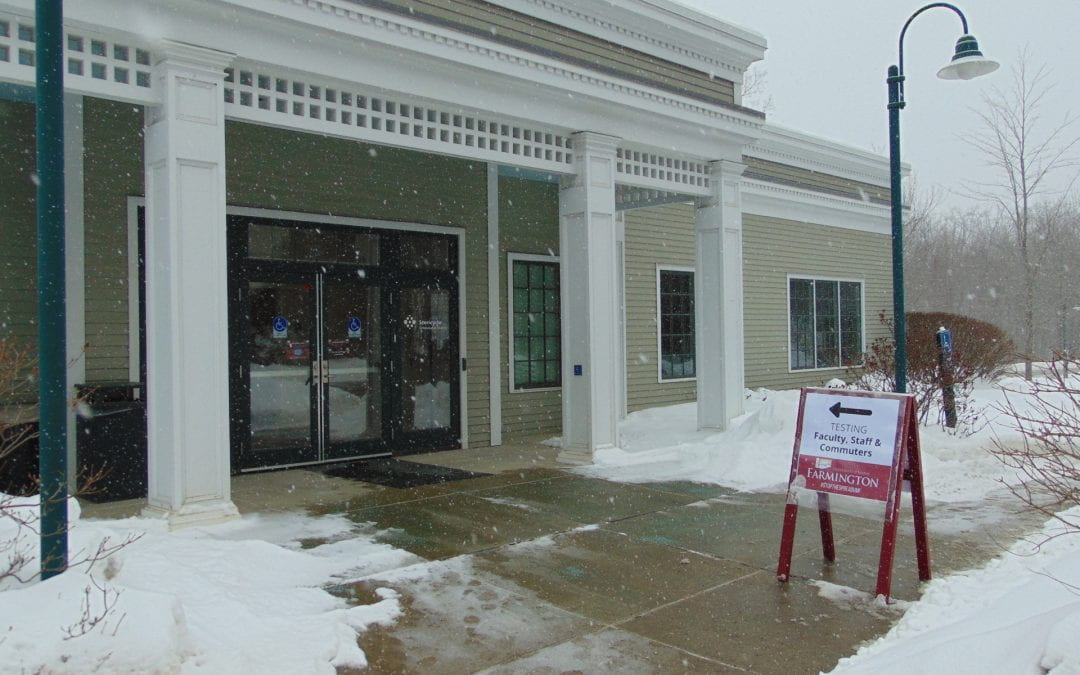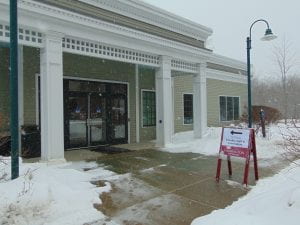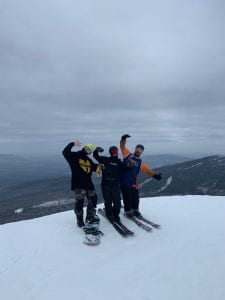
Mar 6, 2021 | Archives, Feature |
By Michael Levesque, Contributing Writer

Photo courtesy of Nancy Prentiss, Biology Class
The Natural History of a Maine Watershed class taught by Nancy Prentiss, accompanied by Maine aquatic professionals, ventured out to lay Atlantic salmon eggs near Avon, ME.
Classified as an endangered species, Atlantic Salmon are almost exclusively found in New England and waters north. These fish travel up rivers, like the Sandy, to lay their eggs and exit later to spend years of their lives out in the Atlantic Ocean. After their time in the ocean, they return to roughly the same area where they hatched from their eggs to lay eggs of their own and repeat the process.
Nancy Prentiss, the professor of the Natural History of a Maine Watershed class, has now made this trip three years in a row. She looks forward to this trip every year. “I’m definitely a field person,” Prentiss says, “I really pushed hard to submit a form for approval.” Luckily for the class, approval was given. They were able to utilize the class’ small number of students and independent travel to help make sure that everyone involved stayed safe.
Joining Prentiss and eight members of the class were the Department of Marine Resources, the Atlantic Salmon Federation and the National Marine Fisheries Service. Previously, the class prepared for the trip by practicing using snowshoes the week before. Despite frigid weather, COVID-19, and having to trudge through snow on snowshoes, the class persevered.
After locating a spot to lay the eggs, a gravel nest was made–similar to that made by actual salmon–to help protect the eggs. A tool resembling a funnel was used to create the depression in the ground. This process was delayed as cold temperatures made some of their equipment freeze. Although there were delays, Prentiss and her class embraced the challenges. “This is science,” Prentiss said.
Describing the eggs as similar to “Orbeez”, Hope Norton mentions she wasn’t expecting a class trip like this involving professionals to happen. The eggs were previously fertilized three months before. As eggs and young fish, they will call that nest home for approximately two years before making their own journey to the ocean. “I just love throwing students into a situation and then you learn by doing,” Prentiss says. “When [the students] are doing it themselves, that’s the best way to learn.”
Lauren Preis, a student in the class, described the struggles these salmon face today. “They have trouble migrating because of dams and culverts,” said Preis. “For every 15,000 eggs, only one adult salmon fish will return,” Preis says. Because of these grim statistics, blockages are a problem for the Sandy River and for other places and species as well.
Although these rates are alarming and frustrating, some studies and efforts show these fish as possibly having a chance. “There are fish returning from the fertilized eggs they have planted,” Prentiss says. Efforts made by educational institutions like colleges and high schools in Maine as well as state and federal agencies have produced some hopeful results.
For the class, this was an experience that shaped their student experience while getting them outside of UMF. “It was an amazing life experience,” Preis said.
Preis and her classmates perhaps didn’t imagine taking such a trip in the beginning of the semester, but are grateful nonetheless. “I wish I could do it with everybody,” Prentiss said. “We are always in a different stream and every time I go, I learn more.”
Prentiss is hopeful her class will be able to continue this tradition and have more people down the road lay salmon eggs. The shared goal of this class and others in the industry is to remove these fish from the endangered species list.

Feb 18, 2021 | Archives, News |
By Paige Lilly, Contributing Writer

274 Front St. by Sam Shirley
As the new semester begins, UMF has opened the doors of a new COVID-19 testing center intended for the testing of commuter students, faculty, and staff.
Residential students will continue to be tested in Dearborn Gymnasium, while others will be tested at the new center located at 274 Front St. The new testing center will continue to help with social distancing while testing, along with minimizing interactions between residential and commuter students. “You can only do so much [to minimize student interactions] in terms of classes, but I definitely think it’s going to make a huge difference in terms of people’s safety,” said Jessica Howe, the COVID-19 Testing Coordinator.
Howe believes that with the large volume of students being tested this semester, the new testing center will keep crowds down and allow for better social distancing than Dearborn Gymnasium would alone. “With too many people, you can’t social distance or make a proper line in [Dearborn Lobby],” Howe said.
During the fall semester, students, faculty, and staff were randomly selected to get tested in each phase of testing. However, according to an email sent out by Christine Wilson on behalf of the Asymptomatic Testing Team, all students, faculty, and staff who “live on campus, take or teach classes on campus, work on campus, or participate in student athletics” are required to be tested every week this semester in Phase 6 of UMF’s asymptomatic COVID-19 testing.
Getting the word out about that has been another challenge Howe and her team have been facing, but signage and frequent emails have been a factor in overcoming this challenge. “We’re encouraging people to set a time to be their designated testing time every week,” Howe said. “We want people to put it on their calendars and then go through and sign up with us.” This is not required, but Howe believes that it is a great way for people to remember to get tested every week.
Elena Guarino, a sophomore, is one of the students who has tested at the new testing center. “It was interesting because I had never been to that site on campus before so it was a little tricky trying to figure out where to go,” said Guarino. “There is only one entrance [into the parking lot of the building], which I didn’t realize, so I ended up missing it the first time I drove by.”
Troy Johnson, a junior, said he appreciated being able to see the same style of posters that would usually hang on the student center walls in the testing center. “I lived on campus for two years, so being in the student center was a daily occurrence for me,” Johnson said. “Now, I live off campus and because of [COVID-19], I don’t really go [to the student center] much.”
Howe is also excited about the potential that the testing center has for communication with commuter students. “I’ve been trying to hang posters up similar to what would be seen in the student center in order to connect with students in that way.” Her main goal is to keep students, faculty, and staff both safe and engaged in their testing experiences.

Feb 18, 2021 | Archives, Feature |
By Abby Pomerleau, Contributing Writer

Left to Right: Simon Kern, Ryan Townsend and Sam
Scheff skiing and snowboarding at Sugarloaf Mountain.
Photo submitted by Abby Pomerleau.
The UMF Freeride team is making the most out of their season with weekly practices and optional competitions. The United States Collegiate Ski and Snowboard Association (USCSA) competitions are not being held this year, but the Freeride team is still enjoying the opportunity to ski. “Everyone on the team is still giving it their all and is continuing to push themselves because with or without competitions everyone just loves the sport in general,” said Bridget Stephenson, a sophomore who skis on the Freeride team.
Although there are no USCSA competitions, there are a few small competitions available to anyone and require a payment of $120. Some members of the team are planning on participating. “I’m really glad we have this opportunity to compete,” said Ryan Townsend, a junior who also skis on the Freeride team. “It gives us the ability to use the new skills we have been working on in a competitive setting.”
The Freeride team practices at Titcomb Mountain on Thursdays and Sugarloaf on Saturdays. The team also visits the Anti-Gravity Complex (AGC) next to Sugarloaf once a week to use their trampolines. This allows the team to work on new tricks before they try them on the slopes.
Being on a ski team provides the members with a COVID-safe social experience. “I really like to be around people with similar interests as I do,” said Townsend. “Everyone is really cool and very supportive.” By being on the Freeride team, it allows for its members to do what they love while meeting new people.
Regardless of the lack of regular competitions, ski season looks relatively normal to the Freeride team. “Everyone still gets to go skiing together and supports each other to try new things,” said Stephenson. “Everyone on the team is there to do what they love, so even if there wasn’t a team we would all be out there anyway. The lack of competition doesn’t stop us.”
Skiing isn’t just about the competitions for some of the team members. “Skiing has fully shaped my experience here at UMF,” said Townsend. “For me, being outdoors is a major part of my life and skiing contributes to that. Although we can’t regularly compete, skiing on this team is important to me and how I spend my time here at UMF.”
Like Townsend, many UMF students enjoy skiing as a hobby. Titcomb Mountain is roughly 5 minutes from campus, while Sugarloaf is roughly 55 minutes from campus. Having these mountains relatively close to UMF allows students to have the ability to ski when they please.
The Freeride team loves when newcomers join the team. “Everyone on the team is so welcoming and there are people on the team from all ski levels,” said Stephenson. “We have people who are completely new to park skiing and snowboarding, and people on the team who are nationally ranked, so there are plenty of people to seek advice from.”
To join the Freeride team, email the Snow Sports Director, Scott Hoisington, at james.hoisington@maine.edu.

Dec 8, 2020 | Archives, Feature |
By Ciera Miller, Staff Writer

Hannah Binder at Colby’s HT94 installation (Photo courtesy of Ciera Miller)
Since September, University of Maine at Farmington (UMF) students across five disciplines participated in filling out a total of 1,370 toe tags for the Hostile Terrain 94 (HT94) installation at the Oak Institute for Human Rights at Colby College. A toe tag is a piece of cardboard or paper attached to the toe of a deceased person used to identify them. HT94 is an art project organized by the Undocumented Migration Project (UMP), directed by anthropologist Jason de León.
HT94 was born out of the term “Hostile Terrain”, a direct quote from the U.S. government’s Prevention Through Deterrence (PTD) policy. PTD uses the desert and mountains as a form of border patrol to deter people from migrating into the United States through Arizona. However, PTD has failed and migrants continue to flood in.
For this project, toe tags are filled out and pinned to a large wall map at the coordinates at which a dead migrant body was found. Orange tags belong to unidentified people and white tags belong to the identified.
Dr. Gaelyn Aguilar brought HT94 to UMF because she believes in “teaching justice in an unjust world.” She said, “I was hoping that filling out our toe tags would feel an awful lot like the naming of names,” which she compared to the most recent surge of Black Lives Matter protests throughout the country.
Cassie Donald, a UMF student who participated in filling out over 20 toe tags, echoed Aguilar. It made them feel more personally involved and was more than just an assignment. “Putting names to the issue made it very real,” they said. “It brought forward a lot of emotion that reading an article might not.”
Aguilar discussed the language used to dehumanize migrants coming into the U.S. from our southern border. “We call undocumented immigrants ‘illegal’―folks do that to avoid speaking the names of those who’ve died, or even having to imagine their faces,” she said. Aguilar believes contributing to this toe tag installation allowed herself, her faculty members, and her students to reinvision these migrants and give them their names back, not only in individual consciences but in our national conscience as well.
Senior Adriana Burnham knows what it’s like to experience this language. “I’m half-Mexican, and I get a lot of jokes about jumping the border,” she said. Due to Burnham’s heritage, it felt personally disrespectful not to fill out these toe tags. Living in the U.S., Burnham reflects that most don’t have to stress about crossing into a new country to start a new life and/or supporting families from afar. “It gives a reality to something we don’t see in Maine,” she said. “We have this chance to recognize these people who risked their lives.”
Laney Randolph, a senior education major, was blindsided by the amount of tags UMF received to fill out. She hadn’t realized how many people died crossing the border. “It’s horrifying to think that this isn’t something most people are aware of,” Randolph said. “I think Americans would have a much more empathetic attitude towards immigrants if they knew just how difficult and dangerous it was to get here.”
Their reactions are the purpose of HT94. This installation is a moment of global reflection and remembrance of those who’ve died on this hostile terrain, trying to cross into the United States. Donald said it best: “It’s important for people outside of the issue to gain awareness of the issue.”
Mar 30, 2020 | Archives, News |
Andrea Swiedom Staff Reporter
While domestic UMF students living on campus were able to easily relocate to Scott Hall, or make arrangements to return home in the midst of the COVID-19 pandemic, international students were forced with tough decisions on whether or not to remain in Farmington and how to get home should they decide to leave. These students had to grapple with the additional stress of navigating border policies, booking flights threatened by cancellation, and the potential of being quarantined upon arriving home.
For 25-year-old French Teaching Assistant Enzo Boulay, the desire to remain in Maine and wait out the pandemic seemed like the most viable option, until March 19. “I had two choices. I could stay at my friend’s house in North Yarmouth or I could have stayed in Farmington,” Boulay said over video chat from his room in Le Mans, France.
“They gave me a room in Scott, and my plan was to come sometimes to Farmington to work and stuff, but one week ago Lynne Eustis and Linda Beck, my advisor, told us, ‘You should leave now, I highly recommend that you leave now.’”
Boulay made plans to return to UMF for the Fall 2020 semester and made his way back to what felt like a deserted country. “In Paris a lot of people have masks and in Levon I saw nobody. I just saw people in the train station, but in the streets there’s nobody.”
French exchange student Jennifer Guisset received the same recommendation by Eustis and Beck, but ultimately made the decision to return to her hometown of Toulouse due to the pressure she was receiving from the French embassy. “I didn’t feel kicked out from Farmington. That was my choice, and I took one week and a half to make my decision,” Guisset said over a video chat while walking around her mother’s vacant flat. “I had a lot of support. Linda and Lynne were always there for us; they gave us the support we needed.”
Meanwhile, Spanish Teaching Assistant Alba Fernandez had every intention of remaining in Farmington rather than returning to Argentina during the pandemic as she was already in the process of extending her visa for a summer teaching position with Upward Bound. When the announcement first broke about the UMaine system transferring the remainder of the semester to virtual courses, Fernandez was assured that she could continue her position as a TA online and continue to live on campus.
But responses to the pandemic were changing on a daily basis for the UMaine system as well as immigration policies for the United States and Argentina, and on March 19 Fernandez was strongly urged to return home by her advisor.
“By that time, it was impossible. Flights were cancelled, airports were closed,” Fernandez said via video chat while sitting in the sun outside of Scott Hall. “It will be at least May until I am allowed to go back to Argentina because the government closed the borders, and even Argentina people are not allowed to get into the country. So basically, at the beginning it was my decision, but now I don’t have a choice.”
Both Fernandez and Guisset had to take into consideration the health and safety of their families as well. Fernandez feared returning home because her mother already has a compromised immune system, and Guisset’s mother has cancer.
“This is all about adaptation everywhere,” Guisset said, standing in a room full of half-packed boxes left behind by her mother. “I took the plane on Friday; I arrived on Saturday. I stayed at my friend’s house in Paris to rest a little and to let my mother quit her apartment and go to her family’s house.”
Guisset will live alone in her mother’s flat to ensure her safety, but despite the isolation, she maintained a positive attitude. “When I was in medical school, I was always studying alone in my flat. So I am kind of used to this.”
Boulay, who has been quarantining himself in his room for the recommended two week period, expressed less contentment with the situation. He had been watching television and playing video games to pass the time, but even after his two week quarantine he will have very little freedom. In France, people are only allowed out of their homes for one hour of exercise a day or to go to the grocery store.
“If we go out without a good reason we get fined 135 Euros,” Boulay said. After the third offense, the police have the right to arrest people for violating the safety precautions that France is enforcing nation-wide.
“The police are in my neighborhood, and they are always watching,” Guisset said. With movement so restricted in France, she is thankful for UMF’s quick response to convert all courses to online classes, knowing that this will add structure and routine to her days.
“I think Americans reacted very fast when faced with coronavirus. For example, in France they don’t have online classes,” Guisset said. “They don’t know how they are going to have graduation at this moment. They don’t have classes, they don’t have exams, they don’t have anything.”
As courses resume online, Fernandez will be adjusting to virtual platforms to conduct her office hours and assist with Spanish courses while also consistently checking in with her family and friends in Argentina. “I think international people face an extra obstacle or challenge, which is processing this pandemic situation while so far away from home and from our people,” Fernandez said.
Mar 30, 2020 | Archives, News |
Andrea Swiedom Staff Reporter
Less than 90 students now reside on UMF’s campus in Scott Hall after the university officially closed all other dorm residencies on March 19 in response to COVID-19. The students living in Scott must now adjust to a condensed version of UMF which consists of their residence hall and the Student Center. Previously, students were able to use the Fusion lab spaces, but as of Sunday evening, VP of Student Affairs, Christine Wilson, announced all campus labs will be closed until further notice as a precaution.
Junior Khadija Tawane said over a video call that she is struggling to establish a healthy routine under the new restrictions. “They don’t have any activities in the dorms, and we are just in bed all day. My back hurts just from laying down all day and eating trash food!” she said.
UMF has put a slew of safety measures in place to help prevent the spread of coronavirus on campus which has greatly impacted socialization. All students are living in their own rooms in Scott and bathrooms have been assigned to a maximum of three people.
“This just lessens the risk of bacteria and what not,” Community Assistant (CA) Kellsie Britton said during a video call interview. “There’s also a no guest policy. Anyone who does not live in Scott, even people who live in campus apartments, can’t visit.” Britton did add that students living in Scott can visit each other within the residence hall.
Even the Beaver Lodge has new restrictions to minimize contact for employees and students. No more than 10 people are allowed in the cafeteria and lounge area and students are now required to pre-order dinner. “They sanitize everything as soon as people are done,” Britton said.
Students are also discouraged from traveling out of state or to any high-risk counties within Maine. “If they leave to go to a county that is high-risk like Cumberland then when they get back they are expected to go into a quarantine period which is in FAB,” Britton said. “They get their own suite and their own bathroom and they get food delivered to their door.”
Spanish Teaching Assistant Alba Fernandez is staying put in her dorm room with the exception of the occasional walk. “I am listening to music, watching the news, talking to people over the phone; that’s really important for me, talking to people,” Fernandez said during a video call on a sunny afternoon while she sat outside of Scott Hall.
Tawane and Fernandez keep each other company on campus, but Tawane does leave UMF regularly to work at Pinewood Terrace, an elderly home care center which has enacted similar safety precautions to UMF. “At my workplace, no visitors are allowed,” Tawane said, who seemed confident to continue working during the pandemic. “I am healthy. I’m not going anywhere. I am just working.”
Instead, Tawane was primarily concerned about adapting to virtual platforms for classes. “I have never done online classes and it’s just stressing me out, and I learn better in person,” Tawane said. “I am not good with technology, and I have never used the Zoom thing and one of my professors wants me to do a presentation through zoom.”
For Fernandez, loneliness is more of an issue than the stress of adapting to online courses. “Even though you are with people, you feel so lonely. We are all trying to process this situation so I feel like I cannot ask for help because we are all going through the same,” Fernandez said on a video call while sitting next to Tawane. “We all feel lonely and this is a huge mess in our lives.”
As a CA, Britton is used to helping students cope with a variety of circumstances while living on campus, but now she has the added responsibility of deciphering the new waves of information that she receives on a daily basis regarding the coronavirus.
“I have tried to be as informed as possible with the emails coming out. Any misconceptions coming out, I need to kind of correct those,” Britton said. “I think it’s very important to just be there and make sure that everyone’s feelings and thoughts are being heard which can take a toll on some of us.”





